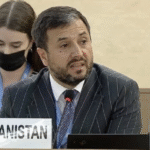
The recent ban by the Taliban’s Ministry of Higher Education on over 700 books and the removal of 18 academic subjects from Afghanistan’s university curricula—primarily involving content related to human rights, women, democracy, and political systems—is part of this group’s broader policies for ideological control over education. This action, based on reports from media outlets such as BBC and Al Jazeera, includes bans on books written by women and resources published in Iran or with Western support. In the following, I analyze this issue from two perspectives: logical (focusing on cause-and-effect arguments and internal contradictions) and scientific (relying on empirical evidence from fields like sociology, economics, and education). The analysis is based on available data from international reports such as those from the United Nations, Human Rights Watch, and academic research, without ideological bias.
Logical Analysis: Cause-and-Effect Arguments and Contradictions in Taliban Policy
From a logical viewpoint, this ban can be justified as an ideological control strategy, but at the same time, it reveals numerous contradictions and illogical consequences:
1. Causal Argument: Preserving Ideological Identity and Preventing External Influence
The Taliban justifies these measures by citing “incompatibility with Sharia and the policies of the Islamic Emirate.” Logically, this approach is understandable for a group that has gained power through religious ideology. Removing subjects like “Human Rights and Democracy” or “Sociology of Women,” and banning books written by women (at least 140 titles), prevents the spread of ideas that could challenge the foundations of their power. For example, if students become familiar with democratic concepts or gender equality, they might rebel against the Taliban’s authoritarian structure. This logic is similar to the strategies of historical totalitarian regimes like the Soviet Union or Nazi Germany, which used censorship to maintain ideological cohesion. Therefore, from the perspective of power survival, this action appears “logical.”
2. Internal Contradictions: Undermining the Foundations of National Development
However, this policy is full of contradictions. The Taliban claims to be seeking “reform” in education, but removing subjects like “Combating Administrative Corruption” or “Moral Philosophy,” which could even align with Islamic principles, indicates a non-selective and extremist approach. Logically, if the goal is to preserve Sharia, why are subjects like “Islamic Philosophy” also taught with a “critical perspective”? This contradiction suggests that the ban is more political than religious. Additionally, the focus on banning women’s books—as stated by a member of the review committee, “all books whose authors are women are not teachable”—contradicts the Islamic principle of equality in knowledge (such as the hadith “Seeking knowledge is obligatory upon every Muslim man and woman”). The logical outcome of this contradiction is the weakening of the educational system: universities turn into “Taliban madrasas,” where course content lacks scientific depth, and professors are forced to prepare notes compatible with Taliban policies.
3. Cause-and-Effect Consequences: A Cycle of Backwardness
Logically, this ban leads to a negative cycle. Removing Western or Iranian resources, which often provide the most advanced knowledge, deprives universities of innovation. For instance, banning the subject “Globalization and Development” prevents students from understanding the global economy, which is illogical for a country like Afghanistan that relies on foreign aid. Ultimately, this policy could lead to greater international isolation, as global communities condition humanitarian aid on education.
Scientific Analysis: Empirical Evidence of Impacts on Society and Development
From a scientific perspective, these policies can be analyzed using empirical data from fields like sociology, economics, and educational psychology. Reports from organizations such as UNESCO, Human Rights Watch (HRW), and the United States Institute of Peace (USIP) provide strong evidence indicating long-term damages.
1. Impact on Education and Gender: Sociological Evidence
Studies show that educational censorship in authoritarian regimes, such as what is occurring in Afghanistan, leads to “irreversible damage” to the educational system. For example, HRW’s 2023 report emphasizes that Taliban policies not only deprive girls of education (banning education after sixth grade) but also negatively affect boys, as female teachers have been removed and educational quality has declined. From a scientific viewpoint, this gender-based ban contradicts the “Human Capital Theory” in educational economics: educating women can increase GDP by up to 50%, as educated women have lower fertility rates, better health, and greater economic participation. In Afghanistan, banning women’s books could exacerbate this cycle, as future generations grow up in a closed ideology without access to diverse perspectives. PMC research in 2025 shows that such policies multidimensionally reduce women’s educational opportunities and lead to increased gender inequality.
2. Economic and Social Impacts: Quantitative Data
From an economic perspective, USIP’s 2023 report estimates that banning girls’ education costs Afghanistan billions of dollars annually, as the skilled workforce diminishes. Scientifically, studies in The Lancet journal show that eliminating health-related disciplines (such as banning midwifery training) increases maternal mortality rates—in Afghanistan, the maternal mortality rate is already high (638 per 100,000 births), and this policy worsens it. Additionally, research in ScienceDirect emphasizes the role of “social capital” in education: war-torn societies like Afghanistan need resilient education, but censorship destroys this capital, leading to increased violence and social backwardness.
3. Psychological and Long-Term Consequences: Empirical Approach
From the perspective of educational psychology, censorship leads to a “lack of critical thinking,” which UNESCO’s 2025 report describes as a violation of the right to education. Studies show that students in censored systems have lower levels of innovation and problem-solving, which are essential for a country’s scientific development. In the long term, this could keep Afghanistan in a cycle of poverty, as without diverse education, technological and economic progress halts.
In conclusion, from a logical viewpoint, this policy is “effective” for preserving Taliban power but full of contradictions and leads to backwardness. Scientifically, the evidence indicates deep damages to society, economy, and health, which could take generations to repair. For change, international pressures and support for alternative education are needed, but without internal change, the outlook remains bleak.



